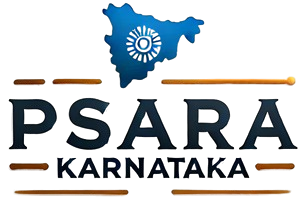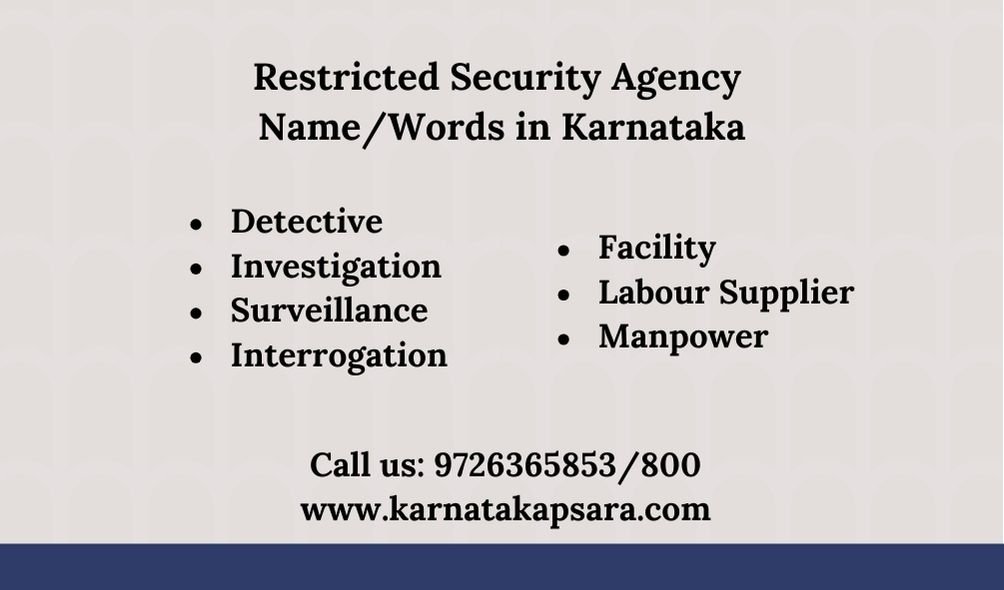Restriction of Words in Security Agency Business in Karnataka
Looking for a list of restricted words for private security agency names in Karnataka? Here, you will find detailed information on the restrictions set by the state and Central Government regarding the use of specific terms when applying for a license or establishing a security agency in Karnataka. These restrictions ensure that private security agencies maintain professionalism and operate within a legal framework that avoids misleading the public. The authorities focus on neutrality and compliance with local laws. Reach out to us for guidance on selecting an appropriate and compliant name for your private security agency in Karnataka.
Complete Guide to Naming Your Security Agency in Karnataka
How to Stay Compliant with Karnataka's Security Agency Naming Rules
Staying compliant with Karnataka’s security agency naming rules is essential for operating legally and maintaining transparency. Under the Private Security Agencies Regulation Act (PSARA), certain terms like “Police,” “Army,” and “Government” are prohibited from being used in the names of private security agencies. These words are reserved for law enforcement and military bodies, and their use by private firms can create confusion or imply unauthorized authority. To remain compliant, security agencies must choose a name that is clear, professional, and free from any misleading associations with government or law enforcement entities. It is also important to ensure the name is unique, check for trademark availability, and properly register the name with the appropriate authorities. By adhering to these guidelines, security agencies can build a trustworthy and legally compliant brand, avoiding legal complications while establishing a strong market presence.
What Terms to Avoid When Starting a Security Agency in Karnataka
Under the Private Security Agencies (Regulation) Act, 2005 (PSARA), certain words are restricted in the names and services of private security agencies in Karnataka to avoid any misrepresentation or confusion with government authorities. The key restricted terms include:
- Detective: Private security agencies are prohibited from conducting criminal investigations, as they do not have the authority to act as detectives.
- Investigation: Security agencies are not allowed to offer investigative services, which are reserved for authorized investigative bodies or agencies.
- Surveillance: Performing covert monitoring or surveillance activities is not permitted under the PSARA license, as it falls outside the scope of security services.
- Intelligence: Intelligence operations are solely within the purview of government agencies and cannot be part of a private security agency’s services.
- Interrogation: Private security agencies do not have the legal authority to detain or interrogate individuals, which is a function reserved for law enforcement agencies.
- Facility: Mixing facility management or maintenance with security services can lead to licensing complications and is restricted under PSARA.
- Labor Suppliers: Security agencies cannot engage in labor supply services, as this is outside the legal boundaries of their operations.
Using any of these terms in the agency name or its services can lead to the rejection of the PSARA license application, imposition of fines, or cancellation of the existing license. It’s essential for security agencies to follow these guidelines strictly to avoid legal issues and ensure they operate within the law.
Importance of Word and Name Regulations in the Security Industry
The importance of word and name regulations in the security industry is critical for maintaining professionalism, transparency, and legal compliance. These regulations are designed to prevent confusion between private security agencies and government or law enforcement agencies. By restricting terms like “Police,” “Army,” or “Government,” the authorities ensure that the public can clearly distinguish between private security services and official law enforcement. This helps avoid misleading perceptions that private agencies have governmental powers or authority, which could otherwise compromise trust and the integrity of the security sector.
Additionally, adhering to these naming and word regulations is vital for obtaining and retaining a valid license under the Private Security Agencies (Regulation) Act, 2005 (PSARA). The use of restricted terms, such as “Intelligence” or “Investigation,” could result in the rejection of a license application, fines, or even the cancellation of an existing license. Compliance with these rules protects both the agency and its clients, ensuring that security services are delivered within the legal framework while safeguarding the reputation of the industry as a whole.
Naming Guidelines for Security Firms in Karnataka: Regulations and Compliance
Here are the key naming guidelines for security firms in Karnataka, based on the Private Security Agencies Regulation Act (PSARA) and local regulations:
- Avoid Government-related Terms: Terms like “Police,” “Army,” “Government,” and “Intelligence” cannot be used in the agency’s name, logo, or branding to prevent misleading the public into thinking the agency has government authority.
- Prohibited Service-related Terms: Words such as “Detective,” “Investigation,” “Surveillance,” and “Interrogation” are restricted, as these activities fall outside the legal scope of private security agencies.
- No Official Affiliation: Terms that suggest an official or governmental affiliation, such as “National,” “Central,” or “Official,” are prohibited to maintain clarity between private security services and law enforcement.
- Clarity in Branding: The name should clearly reflect the nature of the security services provided without implying any other functions like investigation or intelligence operations.
- Compliance with PSARA: Adhering to these naming guidelines is essential for obtaining and maintaining a valid PSARA license, ensuring legal operation and avoiding penalties.
By following these guidelines, security agencies in Karnataka can ensure they comply with local regulations while maintaining transparency and professionalism in their operations.
Step-by-Step Guide to Naming Your Security Agency
If you need to change your private security agency’s name in Karnataka, follow these PSARA-compliant steps to ensure a smooth and legally sound transition:
- Choose a PSARA-Compliant Name: Select a new name that complies with PSARA guidelines and avoids using prohibited terms like “Police,” “Force,” or “Bureau.”
- Update Business Registration: Notify the Registrar of Companies (ROC), MSME, and GST authorities about the name change and ensure that your business records reflect the new name.
- Submit PSARA Name Change Application: File an official application with the PSARA licensing authority, providing your new name, current license details, and necessary legal documentation.
- Inform Relevant Authorities and Clients: Update all key stakeholders, including clients, vendors, and banks, about the name change. Ensure that all contracts, bank accounts, and legal documents are updated accordingly.
- Revise Branding and Marketing Materials: Update your website, business signage, company ID cards, brochures, and other marketing materials to align with your new name.
By adhering to these steps, you can ensure a smooth name change process while remaining compliant with PSARA regulations and maintaining your agency’s legal standing.
Penalties and Legal Actions for Word Violations in Karnataka's Security Sector
In Karnataka, security agencies must adhere to strict word usage regulations under the Private Security Agencies Regulation Act (PSARA). Failure to comply with these rules can lead to serious legal and business consequences, including:
- License Revocation – Violating naming regulations can lead to the revocation or suspension of the PSARA license, halting the agency’s operations.
- Fines – Agencies may be subject to financial penalties for using restricted terms like “Police,” “Army,” or “Government” in their name.
- Legal Action – If the violation is serious, legal action may be taken, potentially leading to lawsuits or court proceedings.
- Reputation Damage – Misleading names can damage your agency’s reputation, resulting in loss of clients and trust.
- Business Closure – Continued non-compliance may result in a shutdown of your business until all naming violations are rectified.
- Scrutiny and Audits – Authorities may increase audits and oversight, disrupting operations and increasing compliance costs.
- Future Licensing Challenges – A history of violations can make it difficult to obtain new licenses or expand operations.
- Personal Liability – Agency owners or directors could face legal consequences, including personal liability in severe cases.
To avoid these consequences, it’s crucial to ensure your security agency’s name adheres to PSARA regulations, maintaining compliance and protecting your business.

